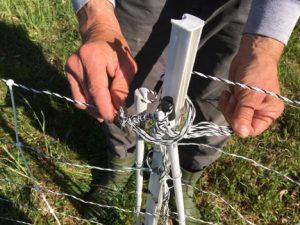Osteoarthritis, Gardening, and the Hands
By Ellen S. Gibson
Your body is your best tool. Take care of it.
The body is a marvel. Unfortunately, we tend to take it for granted when it’s working well. It’s when it doesn’t work so well—when we are in pain and cannot function as we did in the past—that we stop and take notice.
Osteoarthritis is a condition where joints in the body are under stress. When overused, the cartilage that lies between the bones at the joint begins to thin and disintegrate. Without cartilage, there is no cushioning and the bones begin to rub against each other. This causes all kinds of problems: bone spurs, malalignment, swelling, heat, pain, stiffness.
Any joint can be affected, but the neck, spine, shoulders, hips, and knees are all susceptible. The fingers in the hand are particularly vulnerable. Osteoarthritis is very common in the farming world, afflicting one in three farmers. The repetitive nature of farm work causes wear and tear on the joints and that leads to arthritis.
Are you susceptible to arthritis?
There is a genetic link to arthritis. Environmental factors also play a role: the kind of work you do or an Injury from a fall or an automobile accident may damage the joints and result in arthritis. The older you are, the more likely that you have done something to damage your joints. Because of this, arthritis is often associated with older people. Actually, arthritis affects people of all ages.
Advice from an orthopedist
I spoke to Dr. John Chance, a retired orthopedic hand surgeon from Cape Elizabeth, Maine and an avid gardener. Dr. Chance specialized in the hands. He told me that arthritis in the hands and wrists is very common. “I often saw girls with arthritis in their wrists who had started gymnastics before they were skeletally mature. Gardeners often have it. Crawling around in the garden on your hands and knees is too much on the hands and wrists. We have evolved to walk standing up. Our hands and wrists are no longer supposed to be weight bearing.”
He continued, “I would also see farmers in their 60s and 70s—salt of the earth, men and women who had worked all of their lives, from a kid on up. Their bodies had been destroyed by arthritis. It can be caused by injuries, fractures, etc. Arthritis causes malalignment and changes the mechanics of how the body functions. There are many causes.”
“Our bodies are made to do an awful lot, but they need preparation. And we need to listen to what they are telling us. If your hands hurt in the evening, or when waking up in the morning, think back—what did you do??”
EG: Do you mean preparation such as stretching and moving the body before the work of the day?
Dr. C: Yes.
EG: Is there anything else you can do to keep pain under control?
Dr. C: It’s also important to vary your tasks. Change it up. When injured, the hand needs to rest. If there is prolonged hand pain, that means you’re trying to do too much too soon. People get tendonitis from grasping pruners (ie: direct pressure). Sometimes the lining around the tendon becomes inflamed. It causes swelling and inflammation, essentially tendonitis. I often see this at the base of the thumb, near the wrist joint. It’s caused by too much pruning.
Once you have arthritis, you’ve got it, it won’t go away. Symptoms can be managed for a time however.
EG: What do you think about the role of diet?
Dr. C: That’s hard to tell. Diet can improve arthritic symptoms and aid in recovery. Diet, sleep and resting the body are all important aids to recovery.
EG: Do compression gloves help?
Dr. C: Gloves are very important in the garden to protect the skin from punctures and scrapes. Compressive gloves support the joints to some extent and may provide some pain relief.
Thank you so much, Dr. Chance!
If you are experiencing constant pain in your hands from arthritis, it may be time to see your healthcare provider for exercise recommendations, or as Dr. Chance suggested, complete rest may be necessary.

